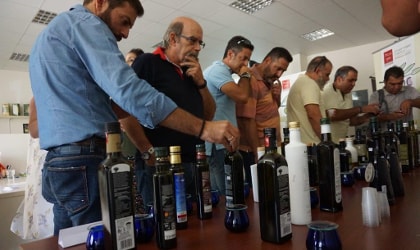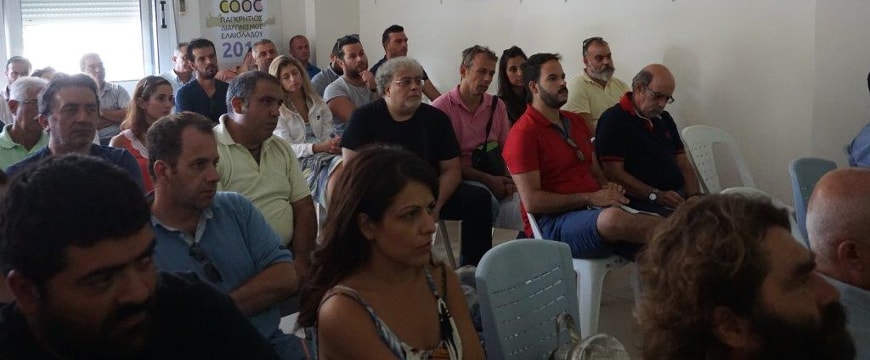At a recent seminar in Rethymno, Crete, olive oil tasting panel supervisor and international judge Eleftheria Germanaki discussed Greek successes in olive oil competitions. Agronomist and scientific consultant Ioannis Metzidakis emphasized the importance of accurate knowledge. And award winning Cretan olive oil producers considered their accomplishments.
On September 9, Germanaki welcomed fifty participants to the seminar room at the Agricultural Cooperative of Rethymno’s Organoleptic Laboratory which she supervises, announcing that all the extra virgin olive oils (EVOOs) receiving awards at the 2017 Cretan Olive Oil Competition which also entered international competitions received additional awards abroad.
Germanaki discussed the role of the International Olive Council, which provides official guidelines for olive oil tasting as well as definitions of different types of olive oil. She explained how olive oils are analyzed, both organoleptically (for aroma and flavor) and chemically (in terms of acidity, peroxide values, and more), going over the specific distinctions between olive oil types.
Agronomist, researcher, educator, and international scientific consultant Dr. Ioannis Metzidakis, former deputy director of the Institute of Olive Tree and Subtropical Plants in Chania, Crete, emphasized the importance of producers obtaining accurate knowledge from an experienced source who understands the many variables involved in the production of excellent olive oil.
Pointing out that the microclimate, weather conditions, precise location, soil quality, olive variety, enemies and sensitivities, and much more make a difference in the pruning, irrigation, fertilization, cultivation, and harvesting methods required for the best possible olive oil, Metzidakis stressed that each situation requires very particular action that cannot be generalized to other situations. Responses to all of these variables, as well as transportation, production, and storage methods and time, make a difference in the flavor, chemical properties, and health benefits of the olive oil produced.
Eleftheria Germanaki provided an overview of the benefits, expectations, costs, and recent Greek success rates in both national and international olive oil competitions. She pointed out that the number of samples judges found defective at the Cretan Olive Oil Competition (COOC) decreased drastically from 19% in the competition’s first and second years to 0.8% in 2017, its third year. Germanaki emphasized the importance of analyzing olive oils to be sure their quality is excellent before sending them to competitions, both to avoid wasting money on competition fees and to help Greece show off its best products.
The country dramatically improved its showing at the New York International Olive Oil Competition (IOOC), for example, between 2016 and 2017, increasing success rates from 12% to 36%. Greece boasted a striking 70% success rate at the 2017 Domina IOOC in Italy—perhaps higher there because Italians are more used to the flavor of Greek olive oils, which they often import in bulk to mix with other olive oils. Even so, Germanaki emphasized that it is crucial for Greek olive oil producers to learn more about how to continue improving the organoleptic qualities of their EVOOs.

Many seem to be taking this advice to heart, judging by the award winning Cretan olive oil producers who shared some of their thoughts. The Best of Crete award winner at the Domina IOOC in Italy, Terra Creta, was represented by Emmanouil Karpadakis, who is also vice president of the Exporters’ Association of Crete.
Karpadakis commented that their “honor in Italy, land of quality” gives them “a responsibility to do better every year, which is more difficult than anything else. Our knowledge helps us most; it has brought us many awards. But awards won’t get you sales, only recognition.” Of course, this is useful, “because Greece is unknown for its olive oil abroad, since [much of] our olive oil goes to Italy in bulk.” He urged producers and exporters to strive for “quality, consistency, and honesty.”
Georgios Andreadakis of Critida Cretan Premium Products, the Best of Crete winner at TerraOlivo in Israel, similarly encouraged “a culture of quality on all of Crete” so that only very good EVOO will be exported. He cautioned, “one award doesn’t last; patience is required. We will lose if we don’t continue this effort.” In English, he added, “open a window – it’s a new world out there.”
A number of Cretan producers are opening windows, with more of them bottling and branding their olive oil on the island for export, as Maria Gerakianaki of EllinDor said they should, in order to honor Cretan and Greek olive oil, as bulk sales for mixture with other countries’ olive oils do not. Award winning seminar participants highlighted their continuous efforts to improve, accepting the responsibility to work hard, cooperate, and use knowledge well in order to show the world how good Greek extra virgin olive oil can be.
One of the owners of Terra di Sitia, winner of one of TerraOlivo’s highest awards, the Prestige Gold, said they keep their eyes open and attempt to do better each year. Maria Foule of Cretan Mill premium olive oils by the Almpantakis family mentioned that an award honors what their whole team did all year, while reminding the audience that what’s in the bottle must be as good as the award suggests it will be to live up to a consumer’s expectations. Others agreed.
Before inviting participants to taste some olive oils, Germanaki summarized her view of the Cretan olive oil scene. “There is really hope: look at all these young people doing so well!”
________
Thanks to Emmanouil Karpadakis for the photos of the seminar participants in the audience and looking at bottles of olive oil.
The Agricultural Cooperative of Rethymno’s Organoleptic Laboratory offers a variety of services, including organoleptic olive oil analysis and consultations on tree and olive oil quality, as well as organizing the annual Cretan Olive Oil Competition. For more information about additional upcoming informative events at the Laboratory, see their Facebook page (in Greek, like their seminars).


